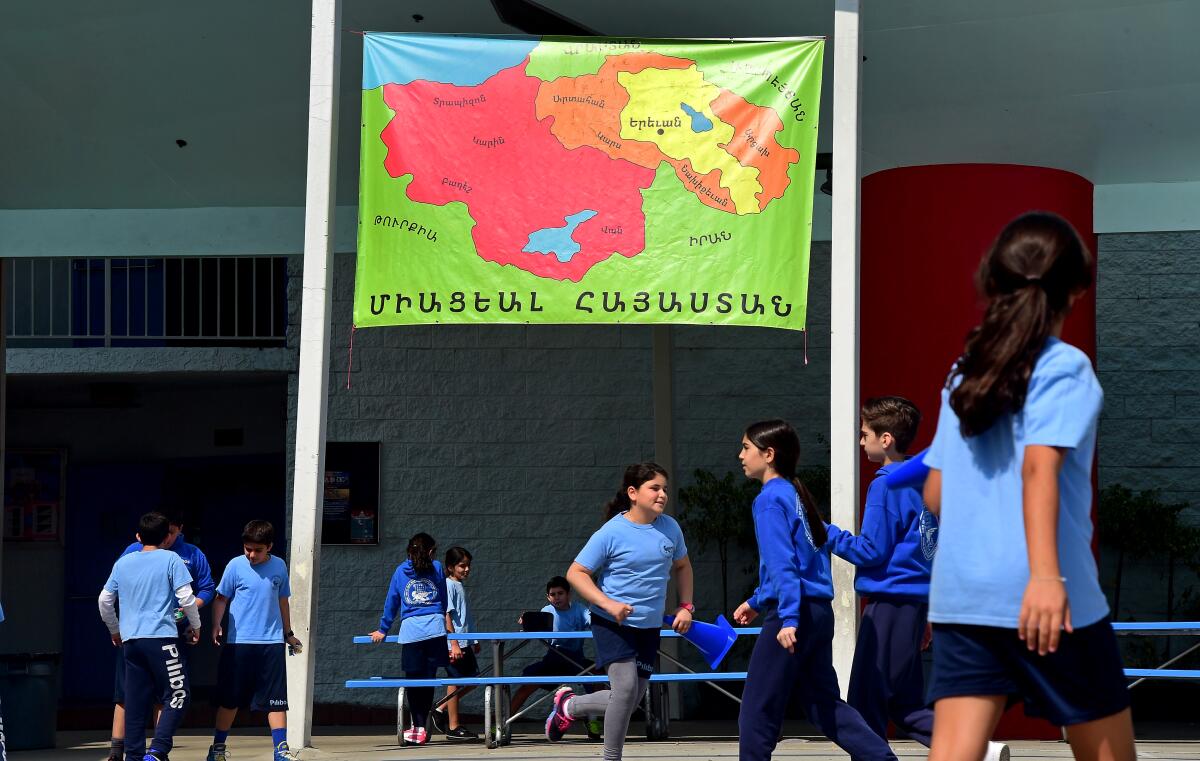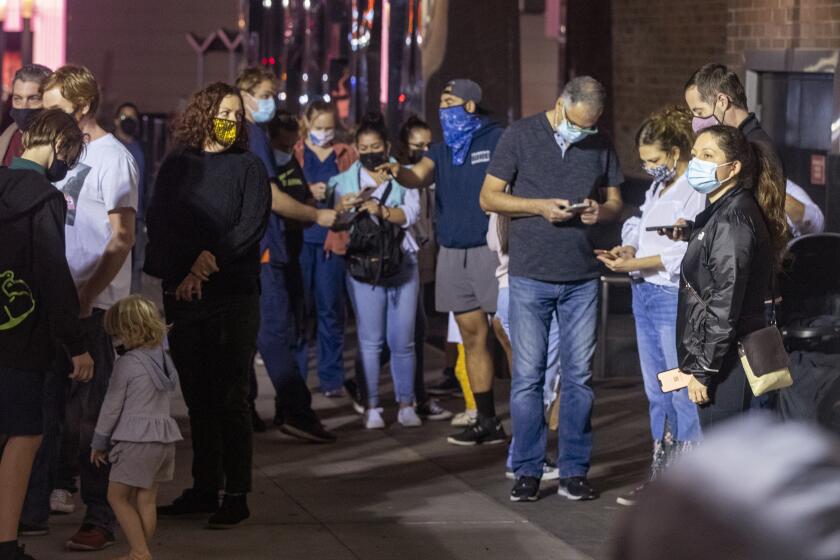Finding in Little Armenia the roots my parents tried to bury

- Share via
Growing up in the 1970s and ’80s, I spent Sundays and holidays at my medzmama’s house in East Hollywood. Two decades ago, the city designated my grandmother’s neighborhood as “Little Armenia,” where the first significant wave of Armenian immigrants settled in the mid-20th century.
Most arrivals had roots in western Armenia, Armenians’ homeland for many thousands of years until a genocidal campaign left more than 1 million dead, and hundreds of thousands displaced ― my medzmama, Herminé, among them.
Both of my parents were Armenian. In a marked departure from many first-generation Armenian immigrants, however, I wasn’t raised in an Armenian community. I didn’t grow up speaking the language. I didn’t attend Armenian schools. I went to public school and my friends were non-immigrant Americans.
My parents sent a mixed message: Being Armenian was central to our identity yet obscured. Between cultural continuity and belonging, they chose the latter.
In Little Armenia, Thai Town and Sunland-Tujunga, vaccination rates lag behind the county average, alarming Armenian American community leaders.
My medzmama’s house and her neighborhood returned some of what was lost. I caught the sights, smells, tastes of my culture. Grizzled old men in trousers smoking cigarettes and playing Tavlou (backgammon) in their driveways. Mournful dirges resounding at St. Garabed’s Armenian Apostolic Church services, and recordings of men singing sentimental ballads, siroones, siroones (“my love”) spilling out of cars and shops. Za’atar and basturma wafting the moment we opened the door to Bezjian’s Market, and the khorovats smoking from backyard barbecues, including ours. My medzmama expertly and lovingly making dishes: manti, yalanche, yogurt soup, dolma, kufte and kadayif.
Still, it could feel like visiting a foreign country, strange and sometimes uncomfortable, like when old people would tsk their tongues and wag their fingers at me. “Amot,” they’d say, “shame,” when they learned I didn’t speak the language.
As a teenager, I had moments of curiosity. I asked my father why I didn’t grow up speaking Armenian. He said he’d wanted me to speak English without an accent. When I expressed interest in learning my mother tongue, he said: “Why learn Armenian? We’re not going back.”
My father came to America to attend the Massachusetts Institute of Technology in 1950. Perhaps having a foreign accent wasn’t such a boon and speaking Armenian was of no help to his career ambitions.
This is not a finger wag, an amot to my parents. I cannot regret their choices without regretting who I turned out to be, which I don’t. I acknowledge the loss inherent in my assimilation. Now with young kids of my own, I’ve come to see their choices as driven by a parental desire to shield your child from pain and to give to them what you lacked.
I lost my parents early ― my father died of a heart attack when I was 23. When my mother passed away from cancer, I was 33 and unmoored by my sudden parentlessness. Haunted by a feeling that something was missing in my life, and a lingering sense that I hadn’t known either of them as well as I could have, I immersed myself in all things Armenian.
I moved from a studio apartment in Silver Lake to a one-bedroom in Glendale and started volunteering as a mentor to Armenian youth. For the first time, I made Armenian friends and took Armenian language classes at Los Angeles City College. I even traveled with a young professionals’ group to the Republic of Armenia. I always stood out as different and sensed that I wasn’t Armenian enough for some. But I found the people who accepted me and eventually, settled on a way to integrate my Armenianness into my life in a way that felt right for me.
The fragmented pieces of my families’ histories finally formed into a narrative, as I began to comprehend each generation’s losses and find my place in the story.
‘Little Armenia’ sign in Hollywood feels strange, but right
“When I was 40 days old, we got out,” my medzmama used to say, in her succinct style. Her family fled Aintab, an ancient city now in Turkey, to escape violence. My grandfather, who died before I was born, was from Kessab, in present-day Syria. They met in Jerusalem, Palestine, and when the Israeli-Palestinian war began, they lost everything ― again. My maternal grandparents and their four kids ― my mother, the oldest ― went to Beirut and eventually secured passage to the U.S. through a special refugee quota. My father was born and raised in the Armenian community of Addis Ababa, the Ethiopian capital. His parents had ended up in Africa after escaping massacres and genocide.
We sold my medzmama’s Little Armenia house a few years ago. The neighbors are gone too. Bezjian’s Market and other stores have closed. It’s not the hub it once was. I do what I can to give my kids a little of Armenia, including visits to the old neighborhood and to new centers of Armenian culture, like Glendale, where recent waves of Armenian immigrants have settled.
Last summer, I took my kids to an Armenian church near us to celebrate Vardavar, a life-affirming holiday where people soak each other with water. I didn’t grow up celebrating it, and only heard of it as an adult. They absorbed the sounds of the language, the smells of the khorovats and the sight of men playing Tavlou. I felt the loss of all that was erased by violence and assimilation — the last 150 years of Armenian history marked by impermanence. And yet, watching my children also renewed my hope that the culture will endure even when the places do not.
Lori Yeghiayan Friedman is a writer living in Oregon.
More to Read
A cure for the common opinion
Get thought-provoking perspectives with our weekly newsletter.
You may occasionally receive promotional content from the Los Angeles Times.










